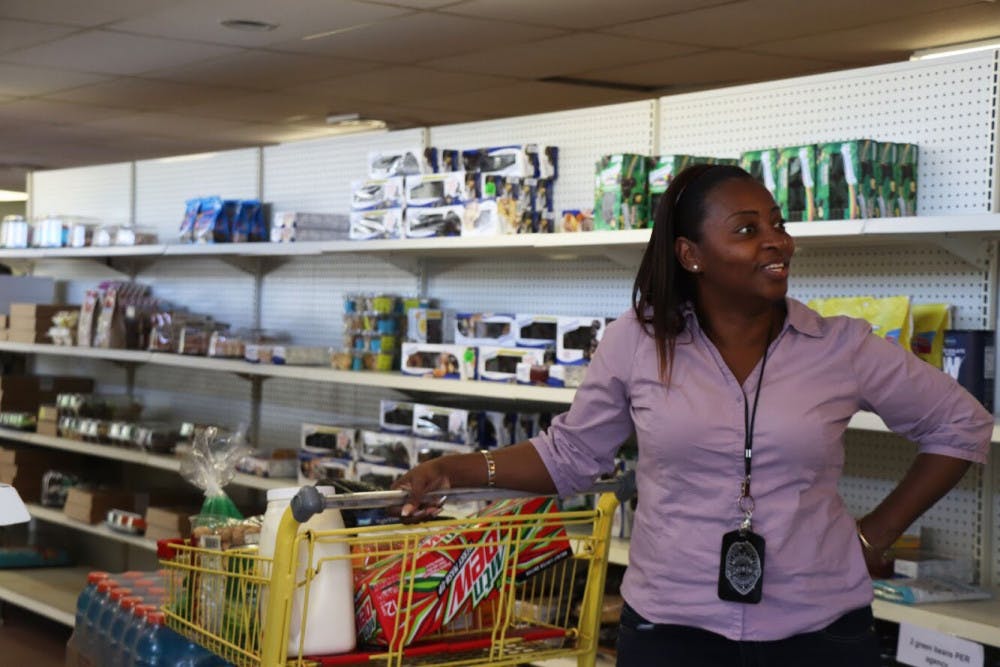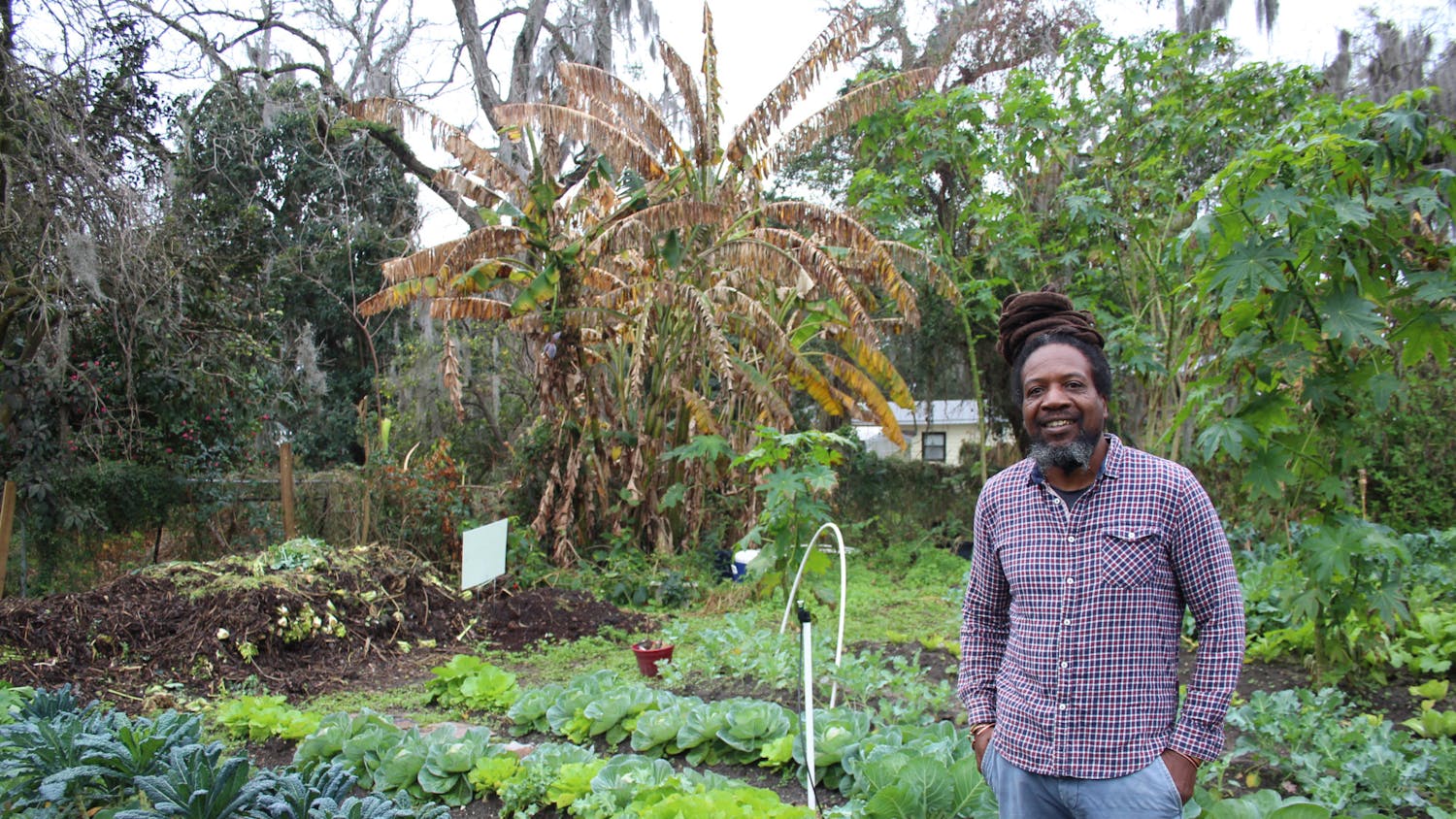Mary Ewing’s car overflowed as she loaded it with blue reusable bags filled with green apples, lettuce and chips.
She had just finished shopping at Bread of the Mighty Food Bank for the nonprofit CHAMP, which she and her husband are involved with. The charity distributes food to individual, local families.
Bread of the Mighty Food Bank distributes and sells food based on weight to local charities. Walking down the aisles of the showcase area, one could quickly mistake the bank for a grocery store.
“This is about poverty and working people,” said Karen Woolfstead, the spokesperson and a director of development for the food bank. “One of the biggest things I’ve learned here is there is no face of hunger.”
Bread of the Mighty Food Bank is used by 190 agencies to shop and distribute the food directly to the hungry in and around Gainesville, Woolfstead said.
Although there are about 900 homeless children in Alachua County, there are 10,000 food insecure children and 50,880 food insecure people as of 2018 out of the county’s 266,944 residents, she said.
In 2018, Bread of the Mighty Food Bank distributed 7.9 million pounds of food, with 5.2 million going to Alachua County, Woolfstead said.
Food insecurity is defined as an experience where individuals or households don’t have access to healthy, affordable food, said Nicole Owens, a state specialized agent with the UF Institute of Food and Agricultural Sciences.
This insecurity relates to food deserts, low-income areas which are located more than one mile away from a grocery store, Owens said.
Owens worked with a master’s student in the department of UF Food Science and Human Nutrition, Vanessa Berthoumieux, who published her thesis on Alachua County Food Deserts in May 2017.
The study looked at corner stores located in food deserts in Alachua County and discovered these stores lacked healthy, affordable food, Owens said.
“The goal is to help them sell and promote healthier items that individuals and food deserts don’t necessarily have access to,” Owens said.
For UF students, staff and faculty who are food insecure, the UF Field and Fork Pantry, established in 2015, provides nutritious food, said Anna Prizzia, the director of the Field and Fork Program.
“People who are experiencing food insecurity should have access to the same quality of food that anyone has access to,” Prizzia said.
In the past four years, the Field and Fork Pantry’s garden has grown 5,000 pounds of produce to be donated to the pantry. When there is a surplus, Prizzia said the garden donates to community food banks like Bread of the Mighty.
The goal of the community garden is to address where food insecurity stems from and to give everyone access to fresh, healthy food, she said.
“We can change the issue of food insecurity in our community, and hopefully in our nation and on our globe by addressing these root causes,” Prizzia said.
The Family Nutrition Program looks for people eligible for the Supplemental Nutrition Assistance Program, formerly known as food stamps in Florida, said Lauren Sweeney, the program coordinator for the Family Nutrition Program.
The program is established in 40 counties across Florida, including Alachua County, Sweeney said.
The program is funded by the Farm Bill, a piece of legislation that dictates federal food and agricultural policy, she said. This funding comes from the U.S. Department of Agriculture.
“We’re teaching people how to stretch their food dollars, eat healthier and shop on a budget,” Sweeney said.
A team of six individuals from the Family Nutrition Program located at UF have educators throughout the state working with different community partners like farmers markets and school districts to help make policies related to accessing healthy foods in the classroom and beyond, Sweeney said.
“This is focused on how our participants are accessing fresh, healthy foods in the communities in which they live,” Sweeney said.
Another program working to alleviate food disparities is Alachua County Public School’s Farm to School to Work program, which started off as a small idea in 2011, said Maria Eunice, the director of Food and Nutrition Services.
Eight years later, the program has expanded to include all schools in the county, 13 local farms and 13 school gardens, she said.
“When the students are growing the produce items in the school garden they feel very proud of what they’ve harvested,” Eunice said.
Local farmers participate by dropping off produce at the Farm to School to Work Hub at the Horizon Center, Eunice said. Then, students in the Growing Educational Training program, where students with disabilities receive job training, help organize, package and deliver the food to school cafeterias.
Other partner organizations that have helped contribute to the program’s success are Working Food, a nonprofit that works to sustain the local food community in North Central Florida, and the Family Nutrition Program at UF Institute of Food and Agriculture Sciences.
Outside of the Alachua County Public School System, Bread of the Mighty emphasizes nutrition among hungry children, Woolfstead said.
The food bank provides dairy, meats and fresh produce in order to give families the chance to cook healthy meals, she said.
“It just brings me joy every time because I know that the families are getting some nutrition, especially the kids,” she said. “They need to be eating more than just cereal and birthday cakes.”
Food for children and senior programs at Bread of the Mighty is free, she said. The food bank funds at least 21 after school programs in the surrounding area, as well as eight food pantries located at schools that parents and students can take from.
Despite the problem of hunger in Gainesville, Woolfstead is optimistic. On May 2, the food bank will be holding its Empty Bowls banquet for the eighth year, where the organization hopes to fundraise.
“That’s one of the biggest things for us is you never know who’s hungry,” she said. “You go to church, you could be sitting next to somebody who doesn’t know what they’re having for dinner.”
Alligator staff writers Kelly Hayes, Mikayla Carroll, Hannah Beatty and Lakshmi Gomez contributed to this report.
Pastor Crystal Griffin stops to talk to a friend while shopping for her ministry on Friday afternoon at the Bread of the Mighty Food Bank. The food bank distributes to five surrounding counties, including Alachua.






